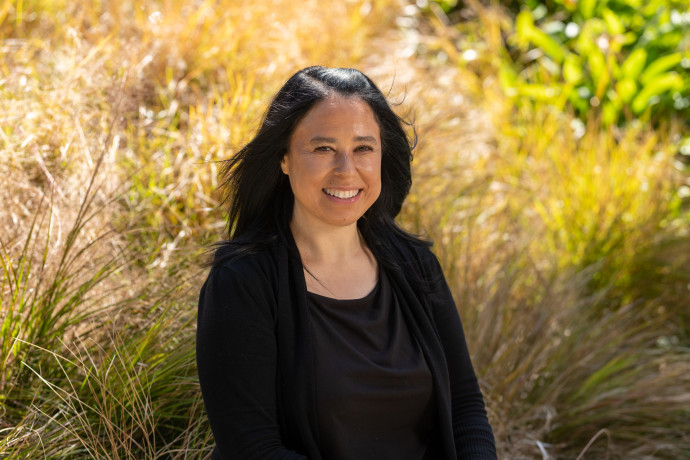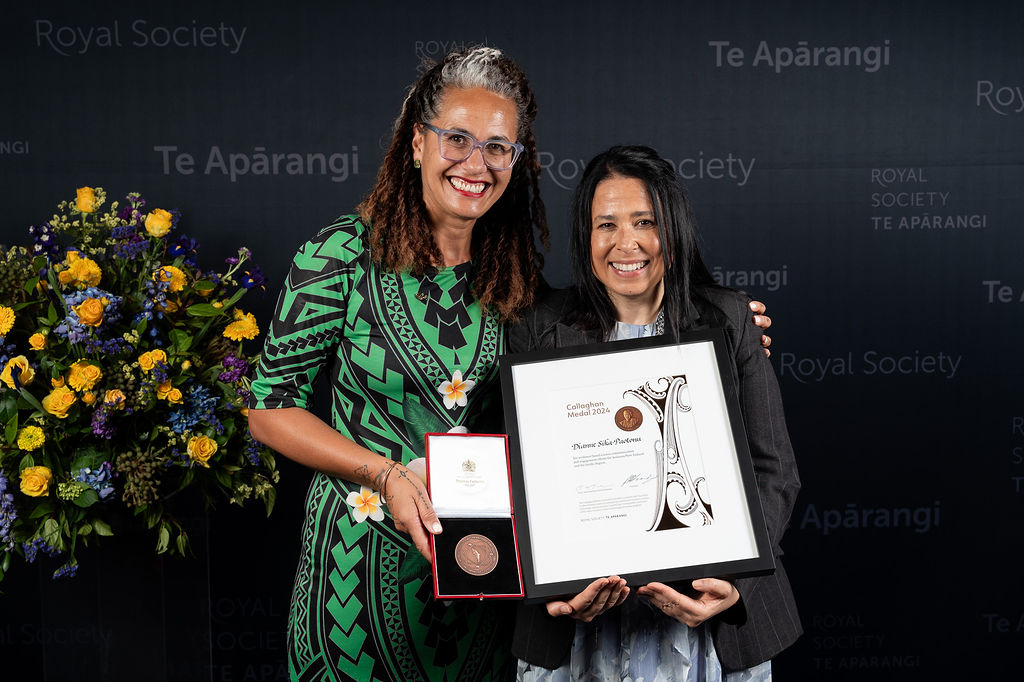2024 Callaghan Medal: Respectful and inclusive science communication and engagement

Associate Professor Dianne Sika-Paotonu has been awarded the Callaghan Medal by Royal Society Te Apārangi for her evidence-based science communication and engagement efforts for Aotearoa New Zealand and the Pacific Region.
An immunology and biomedical scientist, Dianne is an Associate Professor of Biomedical & Health Sciences-Immunology at the Wellington campus, and the Associate Dean, Pacific, for the Division of Health Sciences at the University of Otago – Ōtākou Whakaihu Waka.
Her research is centred on cancer, rheumatic fever and rheumatic heart disease and infectious diseases with a focus on equity as well as addressing health inequities for disproportionately impacted and affected communities.
Communicating effectively with many groups
Many think science communication is mainly about informing the general public of scientific findings, but for Dianne the definition of science communication is much broader and more inclusive.
“Science communication is really important across a number of different areas. It's important in the public setting, the research setting, the teaching setting and the community and cultural settings, such as the Pacific contexts across which I also operate.”
Dianne says that communicating well in all of these areas is an important part of her role as an academic scientist.
For all communication efforts, Dianne says you need to understand what the needs of the audience are, and to identify what the key messages need to be by knowing about your audience as well.
“It’s essential to ensure that the scientific content being shared, disseminated and discussed, is going to be helpful – is evidence-based, current, and relevant, but is also useful, meaningful and delivered appropriately.
“There are some really big issues out there in society right now that are forefront of mind for many people, and it’s important to make sure that clear, evidence-based scientific information and communication is available and accessible.
“My parents gave up everything to ensure that my brother and I had opportunities that they never had, and so I carry a strong sense of responsibility to use the skills that I have to be useful to others and give back and contribute constructively to society. As a Pacific academic scientist, educator and communicator, it is also very important for me to be of service to Pacific communities in Aotearoa New Zealand and the Pacific Region as well.”
Dianne received the 2022 Prime Minister’s Science Communication Prize for her commitment to communication and, particularly, for being a leading voice during the Covid-19 pandemic, explaining the technical aspects of immunology, vaccines, the SARS-CoV-2 virus and infectious diseases.
To date, Dianne has given more than 220 broadcast media interviews and contributed to more than 1500 online and print media stories.
Addressing inequities in health
Significant health inequities exist for many different groups, including for Pacific and Māori communities in Aotearoa New Zealand and in the Pacific Region, with many of these disparities having continued and persisted over time, says Dianne.
To help address these inequities in health and achieve better outcomes, everyone, including health, scientific, medical workers and researchers, needs to connect and engage appropriately and constructively with those they encounter, including Māori and Pacific peoples and communities, she says.
“The need to build a health and research workforce that is more representative of the communities we seek to serve is also essential. All can benefit from communication and engagement efforts that are respectful and inclusive.
“There is now increased awareness and acknowledgement of the need to better connect with different groups and communities who may have been disproportionately impacted and affected by specific health challenges. It is important to ensure always that interactions are respectful, involve listening, have two-way interactions, and take place with a strong focus on building relationships so that where trust may have been lost with people, trust can be rebuilt.”
Efforts to address inequities in health that affect Pacific people’s for example, should also involve Pacific communities, Pacific leaders, Pacific health workers, Pacific researchers and Pacific communicators, so that the approaches and solutions designed for certain health issues can be better targeted and tailored for Pacific communities. Pacific voices, perspectives and approaches are critical for addressing health inequities for Pacific peoples.

Work with Pacific communities on rheumatic fever and rheumatic heart disease
One of Dianne’s key areas of work focuses on rheumatic fever and rheumatic heart disease. There are disproportionately high rates of rheumatic fever and rheumatic heart disease within Pacific and Māori communities in Aotearoa New Zealand and in the Pacific region.
Infections of the throat or skin caused by a particular type of bacteria known as Group A Strep or GAS, can trigger acute rheumatic fever if the infection is left untreated. Acute rheumatic fever is an autoimmune response and if severe enough, or repeated episodes happen that are not treated, this can lead to rheumatic heart disease, permanently damaging the heart.
With no vaccine to prevent the initial GAS infections that causes it, painful monthly penicillin injections are given for a decade or more to prevent any further GAS infections that can trigger rheumatic fever, and lead to the development of rheumatic heart disease.
Dianne has been motivated to find better, longer-lasting, less painful solutions, and importantly, involving Pacific, Māori and other impacted communities in the process.
“As part of this work, we've engaged with our communities and embarked upon what's still actually considered a novel approach to drug design, because we've chosen to involve our communities—our Pacific, Māori and other communities—in the scientific work.
“Science communication should be respectful, appropriate and involve two-way interactions, ultimately seeking to build relationships if researchers are wanting to progress work that is more inclusive, and involves input from our communities.
“Our research efforts have certainly been strengthened through meeting with our communities and coming together to share about the research work that’s taking place, but also importantly listening to people telling us about what has been happening for them, what they think and inviting them be involved in any of the work that’s being progressed.”
Dianne says that these engagement efforts help highlight the critical importance of respectful and appropriate science communication, and also demonstrate the essential requirement of having good listening skills, to help science communicators better understand and respond to the needs of others.
Dianne’s research has involved partnerships with Pacific researchers and collaborators across Oceania, Australia, and the United States, and connecting with peoples and groups from Pacific nations.
Dianne has also led and participated in engagement events and activities that have included Pacific Fono and Talanoa gatherings to support appropriate communication and outreach efforts with Pacific communities and with other groups.
Dianne says it’s also important that more Pacific and Māori scientists, researchers and health professionals are valued as leaders and involved in decision making steps. Also vital is to build science communication skills in the younger generation.
“We need to help, support and encourage the next generation of science communicators coming through in Aotearoa New Zealand, ensuring that we have the diversity and representation that is very much needed.
“This also means training up a workforce of Pacific science communicators who can take over from us!
“I’m incredibly grateful for the opportunities that I've had to be able to connect with people and, importantly, not just share and discuss science together with others, but listen to others sharing as well and learn how we can do better and how we can be better as scientists.
“There's a famous quote by Albert Einstein. He once said that those who have the privilege to know, have a duty to act. And that summarises the sense of duty and responsibility that I carry, and that I feel, in terms of my role as a science communicator.”
In awarding this medal, the selection committee noted that Dianne has three qualities that make her an exceptional communicator. Firstly, she communicates in areas where she has expertise, secondly she is highly empathetic and focused on the needs of her audience, and thirdly she is very engaging.
In addition to winning the Prime Minister’s Prize for Science Communication in 2022, Dianne has won the Cranwell Medal from the New Zealand Association of Scientists (2020), and was a finalist in the Wellingtonian of the Year Awards (2021). She was part of the team that won the 2023 Liley Medal from the Health Research Council of New Zealand and was awarded a Fullbright Scholarship to support her rheumatic fever research. She has received a Royal Order awarded by the late King George Tupou V of Tonga in recognition of scientific achievement.
Callaghan Medal:
For an outstanding contribution to communication of science or technology.
Citation:
To Dianne Sika-Paotonu for evidence-based science communication and engagement efforts for Aotearoa/New Zealand and the Pacific Region.
